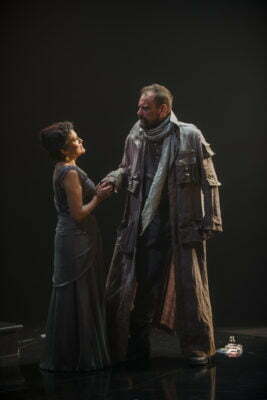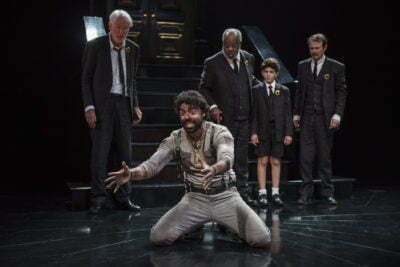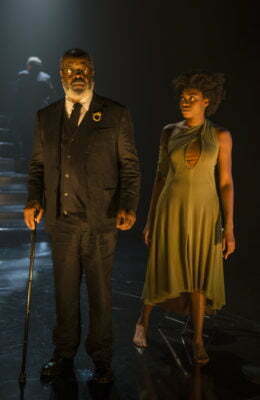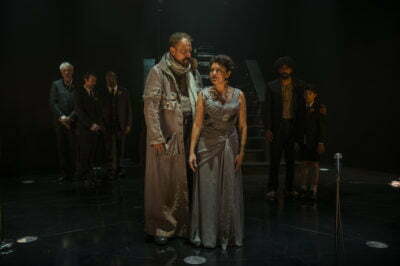Agamemnon

By Aeschylus
Translated by Nicholas Rudall
Directed by Charles Newell
Produced by Court Theatre, Chicago
Lingering in All the Wrong Places
The new production of Agamemnon at Court Theatre certainly lives up to the University of Chicago-based company’s dedication to intellectualism. The second in a planned trilogy of new translations by Nicholas Rudall drawn from all three Athenian tragedians from whom complete works have survived, Agamemnon follows last year’s Iphigenia in Aulis, by Euripides, and anticipates Electra, by Sophocles, which is scheduled for next year. I noted last year that Rudall walks a fine line between faithfulness to the text and modern theatricality. That tension was easier to negotiate with Euripides, who always intended to be a popular writer, but Aeschylus is the earliest playwright whose works survive to the present day, Agamemnon having been written as part of the Oresteia trilogy in 458 BC, and even the other Greeks regarded him as old-fashioned. Aeschylus’s interests are by no means outdated; he concerned himself in the Oresteia mainly with the question of what is justice, which we still ponder over today in plays like Never the Sinner and The Firestorm, currently being produced by Victory Gardens and Stage Left Theatre, respectively. But Rudall’s translation is a bit too concerned with authenticity, and director Charles Newell misused his ability to set the pace.

The story begins with a watchman, later part of the chorus (Gary Wingert), musing on how he has waited for ten years to see a signal that the Trojan War is over. That signal arrives this night, and he rouses the queen, Clytemnestra (Sandra Marquez), from her bed, to prepare for the return of her husband, King Agamemnon (Mark L. Montgomery). He and the other members of the chorus (Thomas J. Cox and Alfred H. Wilson) explain to a boy (Michael Ghantous) the cause of the war, and how Agamemnon sacrificed his daughter, Iphigenia, to the goddess Artemis in exchange for the wind the Greeks needed to sail to Troy. They are proud of the cause, but ashamed of the sacrifice. Unsure of the news’s veracity until the arrival of a herald (Gabriel Ruiz), the chorus also comments that Clytemnestra has ruled with the mind of a man. When Agamemnon finally does arrive, Clytemnestra puts on a show of joy, but her resentment of Iphigenia’s sacrifice is still lurking just beneath the surface, and Agamemnon has brought with him the Trojan princess and prophetess Cassandra (Adrienne Walker) as a war prize. She predicts doom.

The watchman’s opening monologue is a quite lovely bit of poetry from Rudall. He avoids overcomplicating the speech, and opts for a heartfelt, but eloquent description of the watchman’s feelings about his long separation from the king he adores. Too bad the rest of the chorus’s speeches aren’t handled as well. Aeschylus wrote Agamemnon so that the title character is only present for a single scene, and before that, the chorus talks among themselves for half the play, mostly debating whether the news is accurate. Everybody knows that Greece won the war; Newell allows this pointless discussion to go on for far too long. Furthermore, the chorus expresses many different feelings about the thrill of revenge, their sorrow for the suffering of the Trojans as well as their own countrymen, and the gods’ determination to educate mortals through suffering. If its members had distinct personalities and were arguing with each other, or if the chorus was discovering these insights in the moment, their shifts in perspective might have been part of a character arc. Instead, they just seem incoherent and contradictory. The chorus switches its attention randomly between the boy and a circle of microphones around the edge of the stage, and the actors themselves seem alienated from their characters’ sense of morality. Also, the gestures they make whenever a deity is mentioned by name look silly.

The play improves drastically with the arrival of Agamemnon, because now actual characters are talking to each other. Montgomery’s King of the Argives is still proud and cruel, but so exhausted from being surrounded by people he despises and feeling pushed into impossible situations that his harshness has become reflexive, instead of resulting from fresh anger. He can hardly believe it when, five minutes after arriving home, he is arguing with his wife about a carpet. Marquez is a responsive, vulnerable Clytemnestra. She looks deeply hurt at the revelation of Cassandra, which is interesting, and becomes increasingly upset in the final scene when she is unable to persuade the chorus of the righteousness of her actions. Her conversation with Agamemnon contains the production’s most naturalistic acting. Adrienne Walker has a lovely singing voice, and her Cassandra, when she’s lucid, seems a lot more reasonable than most, though her performance is more interesting than empathetic. In the play’s last three minutes, Michael Pogue shows up as the puppet-master Aegisthus for some absolutely delicious scene-chewing villainy.

Unfortunately, the scenes after Agamemnon arrives are as fast as the preceding ones are slow. Rudall wisely did away with Agamemnon and the chorus’s shouted conversation while he is being hacked apart, but he retained a tedious list of all the mountains Clytemnestra set beacons on. And it’s a pity for her character that Newell rushes through the second half of the play, because he winds up presenting the battle of the sexes rhetoric at face value. Really, Clytemnestra is a hypocrite. She kills Cassandra because she is either jealous of the unwilling sex-slave of a man she plans to kill and has been cheating on for years, or she is taking advantage of an opportunity bought with her daughter’s blood to wreak vengeance on the House of Troy, just like Agamemnon. Marquez’s acting implies she understands this, bus she hardly gets an opportunity to explore it. Add to it that Scott Davis’s set design obscures the view from the left seating bank of the house from which Clytemnestra and Aegisthus emerge, and the final sequence is very frustrating. I think it unlikely that anybody would wind up at a production of Agamemnon without knowing what they are getting into, and this play is part of a trilogy both in its original form and in Court’s three-season-long project, making it a component in a whole that is ideally greater than the sum of its parts. There’s a lot to like in this production, but it still missed several opportunities.
Somewhat Recommended
Jacob Davis
[email protected]
Reviewed November 15, 2015
For more information, see Agamemnon’s page on Theatre in Chicago.
Playing at Court Theatre, 5535 S Ellis Ave, Chicago. Tickets are $45-65; to order, call 773-753-4472 or visit CourtTheatre.org. Performances are Wednesday and Thursdays at 7:30 pm, Fridays at 8:00 pm, Saturdays at 3:00 pm and 8:00 pm, and Sundays at 2:30 and 7:30 pm through December 6. Running time is eighty-five minutes with no intermission.
